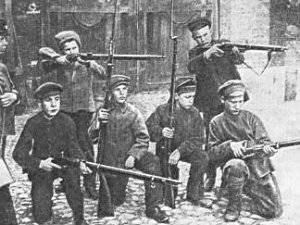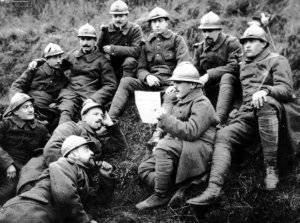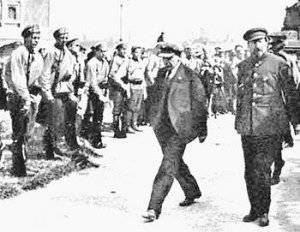Mutiny of the White Czechs
 In the twenties of May 1918, a so-called “White-Czech insurgency” broke out in the country, as a result of which in the vast expanses of the Volga region, Siberia and the Urals. The formation of anti-Soviet regimes there made the war almost inevitable, and also pushed the Bolsheviks to a sharp tightening of their, and so rather tough, policy.
In the twenties of May 1918, a so-called “White-Czech insurgency” broke out in the country, as a result of which in the vast expanses of the Volga region, Siberia and the Urals. The formation of anti-Soviet regimes there made the war almost inevitable, and also pushed the Bolsheviks to a sharp tightening of their, and so rather tough, policy.But before this, the anti-Bolshevik formations did not represent any real power. Thus, poorly armed and devoid of any normal supply, the Volunteer Army numbered only a thousand officers and approximately 1-5 thousands of soldiers and Cossacks in 7. At that time, everyone was completely indifferent to the “whites” in the south of Russia. General A. I. Denikin recalled those days: “Rostov struck me with its abnormal life. On the main street, Sadovaya, full of a crowd of the public, among which there is a mass of combat officers of all kinds weapons and guards, in parade uniforms and with sabers, but ... without national chevrons distinctive for volunteers on the sleeves! ... Volunteers, both the public and “officers,” did not pay any attention to us, no matter how we were here ! However, after the uprising of the Czechoslovak Corps, the situation changed dramatically, anti-Soviet forces received the necessary resource.
In addition, it must be borne in mind that in the spring of 1918, the Bolsheviks, despite all their leftist bends, were ready for some kind of compromise in the field of domestic policy. If in 1917, Lenin acted as a “radical”, then in 1918, he had already argued with the “Left Communists” (A. S. Bubnov, F. E. Dzerzhinsky, N. I. Bukharin, and others). This faction acted from the leftist positions, demanding to accelerate the socialist reorganization of Russia in every possible way. So, they insisted on the complete liquidation of banks and the immediate abolition of money. The “Left” categorically objected to at least some use of “bourgeois” specialists. At the same time, they advocated the complete decentralization of economic life.
In March, Lenin was set up relatively “complacently”, believing that the main difficulties had already been overcome, and now the main thing is the rational organization of the economy. It may seem strange, but the Bolsheviks at that moment (and even later) were not at all supporters of the immediate "expropriation of the expropriators." In March, Lenin began writing his programmatic article “The Next Tasks of Soviet Power”, in which he called for a suspension of “an attack on capital” and some compromise with capital: “... It would not be possible to define the task of the present moment with a simple formula: continue the attack on capital ... in the interests of the success of the further offensive must be “halted” now the offensive ”.
Lenin puts the following in the forefront: “The organization of the strictest and national accounting and control over the production and distribution of products is decisive. Meanwhile, in those enterprises, in those sectors and aspects of the economy that we have taken away from the bourgeoisie, we have not yet achieved accounting and control, and without this there can be no question of the second, equally essential, material condition for the introduction of socialism, namely: about raising, on a national scale, labor productivity. ”
 At the same time, he pays special attention to the involvement of “bourgeois specialists”. This question, by the way, was quite acute. The left communists opposed the attraction of bourgeois specialists. And it is very significant that on this issue along with the Socialist-Revolutionaries and Mensheviks, who seem to have occupied more “moderate positions than the Bolsheviks. But no, moderate socialists for some reason were against attracting specialists, strengthening discipline in the workplace and among the troops.
At the same time, he pays special attention to the involvement of “bourgeois specialists”. This question, by the way, was quite acute. The left communists opposed the attraction of bourgeois specialists. And it is very significant that on this issue along with the Socialist-Revolutionaries and Mensheviks, who seem to have occupied more “moderate positions than the Bolsheviks. But no, moderate socialists for some reason were against attracting specialists, strengthening discipline in the workplace and among the troops.The “Left” criticized Lenin in every way for “state capitalism”. At the same time, Vladimir Ilyich himself was ironic: “If, approximately in half a year, we established state capitalism, it would be a tremendous success.” (“On the“ Left ”Childhood and on the Petty-Bourgeois”). In general, in terms of relations with the urban bourgeoisie, many Bolsheviks expressed readiness to make a substantial compromise. There have always been trends in the leadership that suggested abandoning immediate socialization and the use of private initiative. A typical representative of such trends was the deputy chairman of the Supreme Economic Council, V.P. Milyutin, who called for building socialism in alliance with the capitalist monopolies (the latter were supposed to be gradually socialized). He advocated the incorporation of already nationalized enterprises, leaving 50% in the hands of the state, and returning the rest to the capitalists. (At the end of 1918, the Communist faction of the Central Executive Committee of the Soviets, which developed a project for the full restoration of free trade, began to play the role of a kind of opposition to the regime.)
Lenin himself did not approve this plan, but he did not intend to abandon the idea of an agreement with the bourgeoisie. Ilyich put forward his own version of the compromise. He believed that industrial enterprises should be under workers' control, and they should be directly managed by the former owners and their specialists. (It is significant that the left communists and left-wing Socialist-Revolutionaries immediately began to oppose this plan, who spoke about the economic Brest of Bolshevism.) In March and April, negotiations were held with the big capitalist Meschersky, who was offered to create a large metallurgical trust with 300 thousand workers. But the industrialist Stakheyev, who controlled the 150 enterprises of the Urals, himself turned to the state with a similar project, and his proposal was seriously considered.
 As for the nationalization carried out in the first months of Soviet power, it did not have any ideological character and was, for the most part, “punitive”. (Its various manifestations were examined in detail by the historian V.N. Galin in a two-volume study entitled "Trends. Interventions and Civil War.") In most cases, it was a conflict between workers who wanted to start production and the owners, whose plans included its suspension. and even coagulation - "until better times." In this regard, the nationalization of the plant “AMO” owned by the Ryabushinsky is very indicative. Even before February, they received from the government 11 million rubles for the production of 1500 cars, but did not fulfill the order. After October, the factory owners fled, instructing the directorate to close the plant. The Soviet government, however, decided to allocate 5 million to the plant so that it continued to function. However, the management refused, and the plant was nationalized.
As for the nationalization carried out in the first months of Soviet power, it did not have any ideological character and was, for the most part, “punitive”. (Its various manifestations were examined in detail by the historian V.N. Galin in a two-volume study entitled "Trends. Interventions and Civil War.") In most cases, it was a conflict between workers who wanted to start production and the owners, whose plans included its suspension. and even coagulation - "until better times." In this regard, the nationalization of the plant “AMO” owned by the Ryabushinsky is very indicative. Even before February, they received from the government 11 million rubles for the production of 1500 cars, but did not fulfill the order. After October, the factory owners fled, instructing the directorate to close the plant. The Soviet government, however, decided to allocate 5 million to the plant so that it continued to function. However, the management refused, and the plant was nationalized.Nationalization was also carried out to curb the expansion of German capital, which tried to make full use of the favorable situation that had developed after the conclusion of the Brest Peace Treaty. They began a mass buying up of shares of leading industrial enterprises of the country. The First All-Russian Congress of Soviets of the National Economy noted that the bourgeoisie “is trying by all means to sell their shares to German citizens, trying to get protection for German law through all kinds of handicrafts, all sorts of fictitious transactions.”
Finally, in June 1918 of the year, an order was issued by the Council of People's Commissars of the RSFSO to “nationalize the largest enterprises”, according to which the state was supposed to give enterprises with a capital of 300 thousand rubles. However, in this decree it was stated that the nationalized enterprises are given to the free use of the owners who continue to finance production and make a profit. That is, even then the implementation of Lenin’s state-capitalist program continued, according to which the owners of enterprises were not so much “expropriated” as they were included in the system of the new economy.
Under these conditions, long-term technocratic projects began to be conceived. So, March 24 was created by the “Flying Laboratory” of Professor Zhukovsky. She began to work with the Calculation and Testing Bureau at the Higher Technical School (now MSTU Bauman). Other promising projects were conceived. The Bolsheviks began to position themselves as a party of technocrats, the “party of affairs”.
However, excessive urbanism of consciousness seriously interfered with this “cause”. The agrarian policy of the Bolsheviks repelled the broad masses of the peasantry from Soviet power. The Bolsheviks headed for the establishment of a food dictatorship based on the forced withdrawal of grain from the peasants. Moreover, there was an opposition led by Rykov to this course. Moreover, a number of regional Soviets - Saratov, Samara, Simbirsk, Astrakhan, Vyatka, Kazan, decisively opposed the dictatorship, canceled firm prices for bread and established free trade. However, the Central Executive Committee and the Supreme Economic Council over the head of the Soviets reassigned the local food authorities to the drug company.
Of course, some elements of the food dictatorship in those difficult conditions were necessary. Yes, they, in fact, existed - the removal of bread, in one way or another, was practiced both by the tsarist and Provisional Government. The politician had to be somewhat toughened, but the Bolsheviks here had pretty much overdone it, which turned many people against themselves. In fact, Leninists underestimated the strength of the "peasant element", the ability of the village to organize and resist. In the agrarian, peasant country there was a mass discontent with the Bolsheviks, which was superimposed on the discontent of the "bourgeoisie and the landowners."
And now, in this situation, an uprising of the Czechoslovak Corps takes place, which has made civil war inevitable. The performance itself became possible only thanks to the position of the Entente, which hoped to use the Czechoslovak units in the struggle with both the Germans and the Bolsheviks. Back in December 1917, I Jassy (Romania), the military allied representatives discussed the possibility of using Czechoslovak units against the Bolsheviks. England was inclined to such an option, while France nevertheless considered it necessary to limit herself to evacuating the corps through the Far East. Disputes between the French and the British continued until April 8 1918, when in Paris the Allies approved a document in which the Czechoslovak Corps was considered as part of the interventionist forces in Russia. And May 2 at Versailles L. George, J. Clemenceau, W. E. Orlando, General T. Bliss and Count Mitsuoka adopted the Note No. 25, ordering the Czechs to remain in Russia and create the Eastern Front against the Germans. And soon it was decided to use the corps to fight the Bolsheviks. Thus, the Entente frankly headed for the sabotage of the evacuation of the Czechs.
Western democracies were interested in permanent civil war. It was necessary that the reds beat the whites as long as possible, and the whites beat the reds. Of course, this could not continue all the time: sooner or later, one side would have the upper hand. Therefore, the Entente decided to promote the conclusion of a truce between the Bolsheviks and the white governments. So, in January, 1919, she made an offer to all government agencies located in the territory of the former Russian Empire to begin peace negotiations. It is obvious that a possible truce would be temporary, and would be violated in the short term. At the same time, it would only stabilize the state of splitting Russia into a number of parts, primarily the red RSFSR, the Kolchak East and the Denikin South. It is possible that a second truce would follow the first truce, and so it would have lasted a long time. By the way, a similar situation of permanent war developed in the 20-30-s. in China, which was divided into territories controlled by the nationalists of Chiang Kai-shek, the communists of Mao Zedong and various regional cliques of militarists. It is clear that this split only played into the hands of external forces, in particular, the Japanese.
England never abandoned plans to “reconcile” whites with reds. So, in spring, she suggested in the ultimatum form that the communists and P. Wrangel should start negotiations under the arbitration of Britain. Wrangel himself resolutely rejected the British ultimatum, with the result that in May 1920 of the year London announced the termination of white assistance. True, France has not yet refused this assistance and even strengthened it, but this was due to the circumstances of the Polish-Soviet war. The fact is that the French made the main stake on the Poles of U. Pilsudski, whose help was far superior to the help of white. But in 1920, there was a threat of the defeat of Poland and the advancement of the Red Army in Western Europe. It was then that the French needed Wrangel’s support, whose resistance forced the Reds to abandon the transfer of many select units to the Polish front. But after the threat to Pilsudski had passed, the French stopped helping the whites.
Information